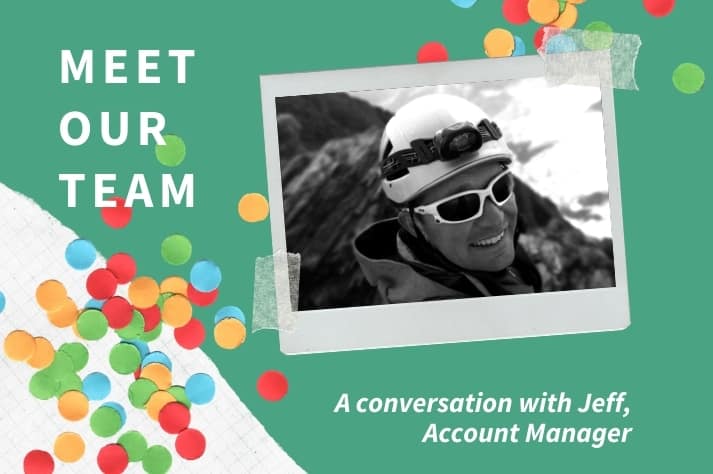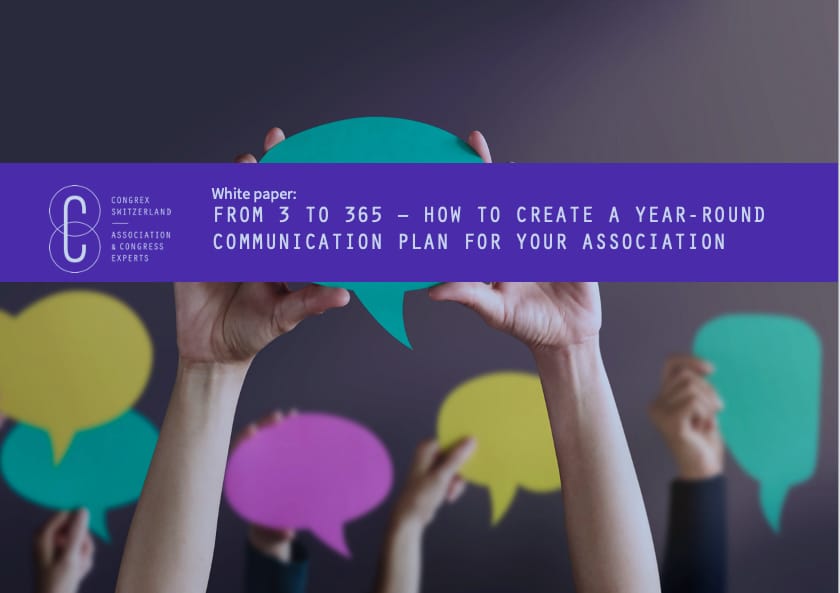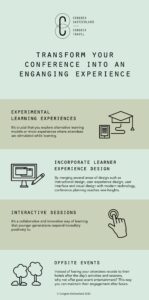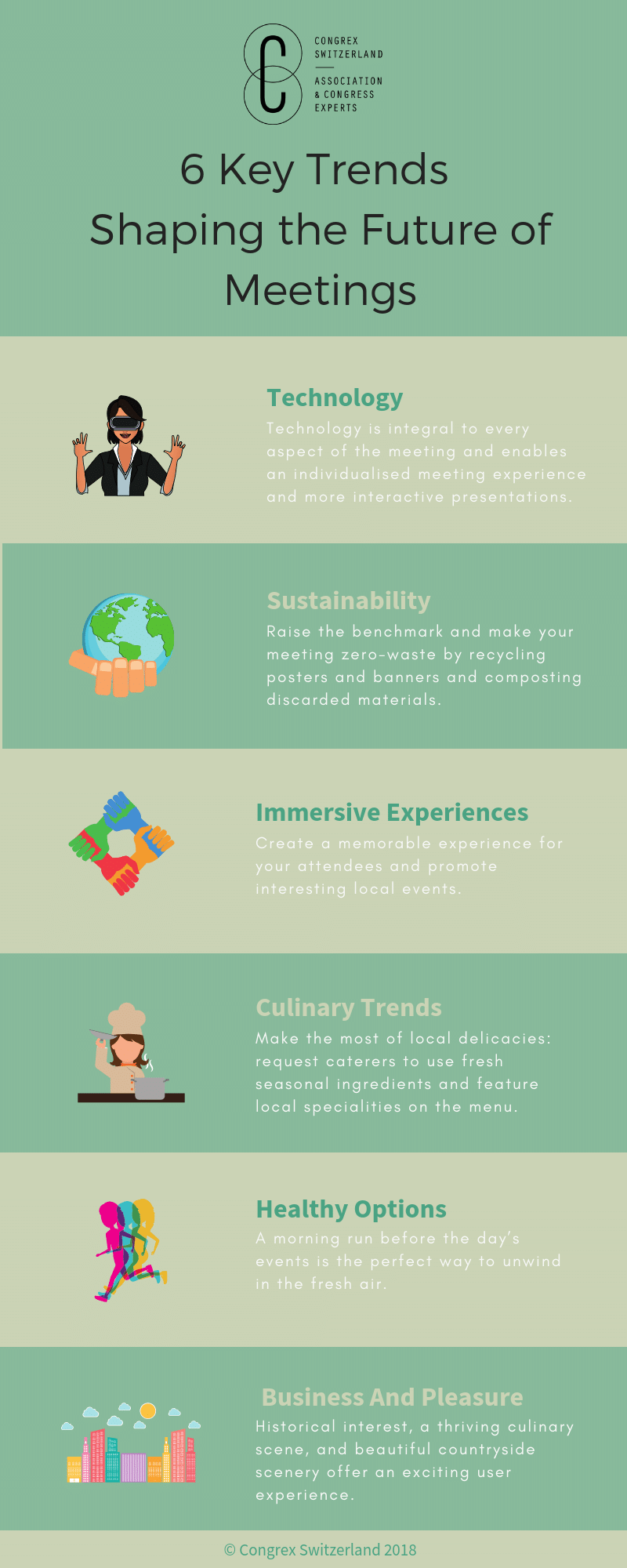We would like to introduce Jeff, Account Manager at Congrex Switzerland.
What is your position at Congrex and what activities are you responsible for?
My role at Congrex is varied. I am responsible for the successful implementation and running of meetings and events that Congrex delivers for its clients. This can mean everything from working on meeting design and strategy (because every event or meeting should have a goal and a purpose), presenter coaching, logistics, you name it, all with the aim of fulfilling our objectives and bringing the event to life for our clients and the participants.
I also work on internal projects as part of the management team, helping to drive innovation and looking for ways to work more effectively across teams. Of course, I work closely with other account managers, which is very rewarding. What I love is that we all have our own strengths (and of course weaknesses), that are complementary to each other, which makes for a very effective team environment, allowing us all to focus on the areas where we offer the most value.
What I love is that we all have our own strengths (and of course weaknesses), that are complementary to each other, which makes for a very effective team environment, allowing us all to focus on the areas where we offer the most value.
Personally, I also enjoy being able to work across all our departments and teams, looking for ways to innovate, develop new ideas and encourage others to contribute with their ideas, all with the goal of helping improve what we do on a day to day basis for our customers and their clients. For me, it’s about making sure each and every participant that attends a meeting has a meaningful and memorable experience that helps them improve themselves.
For me, it’s about making sure each and every participant that attends a meeting has a meaningful and memorable experience that helps them improve themselves.
Self-improvement is a big theme for me. As part of my continuing professional studies (and to complement my CMP accreditation), I have studied the profession of coaching and have gained my Executive Coach Accreditation with the Association of Executive Coaches. This was both rewarding and has given me new skills that I can apply to my daily work.
When I am not working I draw a lot of inspiration from the natural environment and can be found recharging my batteries by climbing, skiing, hiking and (when travel allows) scuba diving. I have also been able to professionally coach all of these activities and this has given me varied experiences that I can draw on in my day to day work.
What would you say is the most important consideration when designing a successful virtual or hybrid meeting?
From my perspective, the most important question to always ask, and to be clear on, is what is the purpose of a meeting? This is true for a face-to-face, virtual or any other kind of meeting. If there is no clear purpose or objective it is hard to determine if the meeting was a success.
As the event industry has changed, grown, and been shaped over the last years and especially by the pandemic, we have seen the shift from a focus on Return on Investment (ROI) to Return on Engagement (ROE) and back again, but I often ask myself and those that I work with, should we not be thinking more holistically? Should we, as an events industry not be providing our attendees with a Return on Experience?
Should we, as an events industry not be providing our attendees with a Return on Experience?
To quote Maya Angelou: “People will forget what you did but people will never forget how you made them feel.” The events industry is part of the ‘Experience Economy’ which involves all the users’ emotions, beliefs, preferences, perceptions, physical and psychological responses, behaviours and accomplishments that occur before during and after an event to enhance human interaction. Did you know, It even has its own ISO number? (ISO 9241-210)
Times have changed. The needs of our attendees have changed. Everyone now has access to the same information and almost instantly. We live in an information-rich environment, but how to make the best use of this information? How to interpret or understand the information? What is the value or implication of the information for ME (the participant)? These questions should be the focal point of a presentation, and not just the information itself. Helping participants unlock the value of the information is key and should be the purpose of a memorable presentation.
Helping participants unlock the value of the information is key and should be the purpose of a memorable presentation.
As we seek to provide an experience for our attendees we should be seeking to create a value exchange as often as possible during our meetings. An educational or instructive presentation is not an exchange; it is a one-to-many communication, and all too often there is little or no interaction. It is also not the best format for absorbing complicated information or data. For that, we need to find ways to better allow people to interact.
Over the last year, our industry has changed, and perhaps forever. Everyone is scrambling to integrate tech that has been around for years but was rarely used. So, to answer the question, the design of the event should support and amplify the meetings’ objectives, purpose and goals.
However, regardless of the medium we use, we must not forget that as meeting planners we are bringing people together. People still want to meet, to network, and to learn. This is all very real. The only thing that has changed in the last months is that the meeting room is virtual – not the meeting itself.
However, regardless of the medium we use, we must not forget that as meeting planners we are bringing people together.
With this in mind and knowing that the average adult attention span can be as low as only eight seconds, we need to think about how to provide the most valuable experience for our attendees, and help those we organize meetings to creating an experience that is hard to “click away from”.
A great session does not just capture the speaker’s message – it elevates it, transforms it, and translates it into something memorable and valuable for the participants. For example, applying the ERGA learning model – Experience, Reflect (observe) Generalize and Apply – to a session is a way to help the audience experience and absorb what they learn.
Tell us about the most exciting, fun or challenging virtual congress experience you’ve had during your time at Congrex.
Every meeting has its own challenges and I am learning new things every day, even after almost twenty years working in this industry, which is very rewarding.
Recently we have had the pleasure of working with a very innovative team in the US. By removing physical barriers we were able to put together a team of presenters, clients, designers and producers that worked together across eight time zones. What was great about this event was that we were able to work with the organising committee to bring their theme of “reimagine, rethink and innovate” to life both visually and musically.
Every meeting has its own challenges and I am learning new things every day, even after almost twenty years working in this industry, which is very rewarding.
Find here the client testimonial
Through the use of a metaphor based around art and music, we were able to capture key messages and literally play them back to the audience in real-time with the help of a digital scribe and professional musicians in a unique and memorable fashion, and importantly, in a form that the participants could not find elsewhere on the internet. By using music and images we helped create lasting memories and feelings that words alone could not.
By using music and images we helped create lasting memories and feelings that words alone could not.
With each of the presenters, we had the opportunity to work with them to ensure the best possible delivery, through compelling storytelling techniques, the use of metaphors and images (which we could bring to life using post-production techniques). We were able to portray the material in a way that has not been seen before, and also helped the user remember and express the information – after all, stories and pictures are the way humans have shared information for thousands of years.
Find here the link to the project
Author: Jeff Bateman








